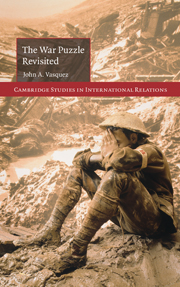Book contents
- Frontmatter
- Contents
- List of Figures
- List of Tables
- Preface
- Preface to the Original Text
- PART I Preliminaries
- PART II The Onset and Expansion of Wars of Rivalry
- 4 Territorial Contiguity as a Source of Conflict Leading to War
- 5 The Realist Road to War
- 6 The Domestic Prerequisites of Wars of Rivalry
- 7 Explaining World War: Its Scope, Severity, and Duration
- 8 Peace
- 9 Conclusion: Solving the Puzzle of War
- Retrospective Commentary on Part II
- PART III Findings on the Steps to War, 1994–2008
- Appendix I A Propositional Summary
- Appendix II Major Findings on the Steps to War
- References
- Index
- CAMBRIDGE STUDIES IN INTERNATIONAL RELATIONS
8 - Peace
Published online by Cambridge University Press: 05 June 2012
- Frontmatter
- Contents
- List of Figures
- List of Tables
- Preface
- Preface to the Original Text
- PART I Preliminaries
- PART II The Onset and Expansion of Wars of Rivalry
- 4 Territorial Contiguity as a Source of Conflict Leading to War
- 5 The Realist Road to War
- 6 The Domestic Prerequisites of Wars of Rivalry
- 7 Explaining World War: Its Scope, Severity, and Duration
- 8 Peace
- 9 Conclusion: Solving the Puzzle of War
- Retrospective Commentary on Part II
- PART III Findings on the Steps to War, 1994–2008
- Appendix I A Propositional Summary
- Appendix II Major Findings on the Steps to War
- References
- Index
- CAMBRIDGE STUDIES IN INTERNATIONAL RELATIONS
Summary
The key to understanding war lies in understanding peace.
Until now we have looked at the onset of war in terms of how interactions have constrained choice by producing a relationship of rivalry and domestic political environments that select out threatening practices and hostile behavior. These lead actors to resort to realist practices and begin a long journey down the road to war. The presence of disagreements and of hostility need not always have this result, however. Whether and how quickly actors will resort to power politics depends on the extent to which the global institutional context provides alternative mechanisms for handling issues.
Part of the reason power politics results in war, especially between equals, is that coercion short of war usually does not resolve a highly salient issue. War occurs because within realist culture it is an institution by which binding political decisions can be made. To the extent that there are other ways of making authoritative decisions, it can be expected that war will be less frequent, especially since these alternative mechanisms will probably be less costly and morally preferred.
Even realists admit that, at the domestic level, government and economic bargaining are allocation mechanisms that are employed to make critical decisions affecting the everyday life of millions of people. Only rarely in established states does war (either in the form of civil war or social revolution) become a way of resolving a political issue. Realists have spent some time trying to understand and to show why the domestic solution to violence cannot be applied globally.
- Type
- Chapter
- Information
- The War Puzzle Revisited , pp. 285 - 314Publisher: Cambridge University PressPrint publication year: 2009

